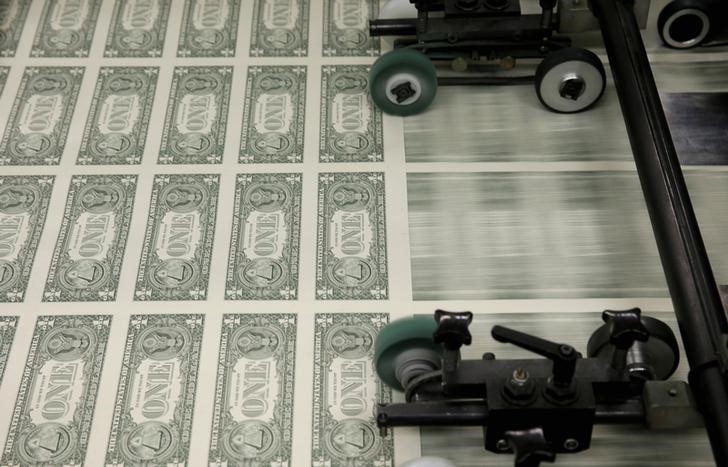Investing.com - The dollar dropped to four-week lows against the other major currencies on Friday, after the release of weak U.S. second quarter growth data dampened optimism over the strength of the economy following the Federal Reserve’s positive outlook earlier in the week.
The Bureau of Economic Analysis earlier said U.S. gross domestic product rose 1.2% in the second quarter, disappointing expectations for a 2.6% increase. The U.S. economy grew 0.8% in the first quarter, whose figure was revised from a previously estimated growth rate of 1.1%.
The downbeat data came after the Fed said on Wednesday that “near-term risks to the economic outlook have diminished” and that the labor market has “strengthened”, after it left interest rates unchanged at the conclusion of its two-day policy meeting.
U.S. employment costs rose 0.6% in the last quarter, in line with expectations, while real consumer spending increased by 4.2% in the three months to June, after an upwardly revised 1.6% gain in the previous quarter.
Also Friday, the University of Michigan said in a revised report that its consumer sentiment index rose to 90.0 in July from 89.5 the previous month, confounding expectations for an increase to 90.5.
Another report showed that the Chicago purchasing managers’ index ticked down to 55.8 this month from 56.8 in June, compared to expectations for a fall to 54.0.
USD/JPY plummeted 2.47% to trade at a three-week low of 102.66.
The yen strengthened broadly after the Bank of Japan announced at the conclusion of its policy meeting on Friday a modest increase in purchases of exchange-traded funds (ETFs), but maintained its base money target at 80 trillion yen as well as the pace of purchases for other assets.
The central bank also kept negative interest rates unchanged at -0.1%.
The move disappointed expectations for a stimulus package of nearly 28 trillion yen promised by Prime Minister Shinzo Abe earlier in the week to boost the economy.
EUR/USD climbed 0.84% to a four-week high of 1.1171.
Preliminary data earlier showed that the euro zone’s consumer price index rose at an annualized rate of 0.2% in July, exceeding expectations for a 0.1% uptick and after a 0.1% gain the previous month.
Core CPI, which excludes food, energy, alcohol and tobacco, increased by 0.9% last month, year-on-year, in line with expectations.
GBP/USD gained 0.62% to 1.3250. while USD/CHF lost 1.01% to 0.9708.
The Bank of England said on Friday that net lending to individuals rose to £5.2 billion in June from an upwardly revised total of £4.5 billion in May, compared to expectations for a rise to £4.2 billion.
But the pound’s gains were capped as investors turned to the BoE’s policy meeting next week amid growing expectations for a rate cut.
The Australian and New Zealand dollars extended earlier gains, with AUD/USD up 1.11% at 0.7585 and with NZD/USD rallying 1.71% to 0.7192.
Elsewhere, USD/CAD erased earlier gains and retreated 0.57% to 1.3079 after Statistics Canada said the country’s GDP fell 0.6% in May, compared to expectations for a 0.4% slip and after a growth rate of 0.1% the previous month.
The U.S. dollar index, which measures the greenback’s strength against a trade-weighted basket of six major currencies, was down 1.11% at 95.61, the lowest level since July 5.
